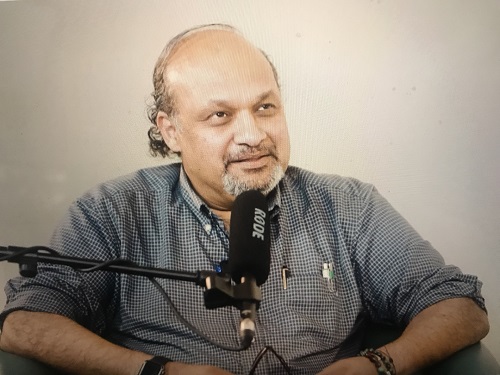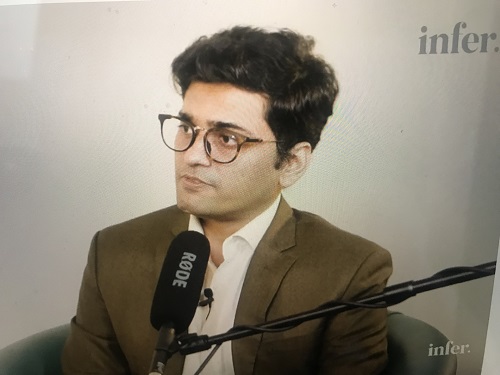Dr Faisal Bari on Leadership, Education in Pakistan
By Elaine Pasquini
Washington: Dr Faisal Bari, associate professor of economics at the Lahore University of Management Sciences (LUMS) and senior research fellow at IDEAS, discussed Pakistan’s education and leadership crises with InferTalks host Usama Nizamani on his September 29, 2023, program.

Beginning with the question of what leadership is, Bari said: “First of all it’s an ethical and moral question. It’s also a question of choices.”
Anyone wanting to be a leader, he continued, must be willing to “take on that responsibility, burden, whatever you want to call it…and to have the ability to think about roles, responsibilities, and human resources.”
“Building the correct coalitions is also important and the ways in which you want to create momentum for what you want to do,” he said. “It’s also necessary to know what the opposition is thinking – opposition to your ideas, not necessarily political opposition, and so on and how you engage with them.”

In addition to a crisis of leadership, there is also a crisis with Pakistan’s institutions that are not working, Bari said. “They have been undermined. They don’t have the strength that we need in institutions. Whether these are universities, whether these are the Supreme Court or whatever, our human resources do not have the ability to do the work that they need to do. We haven’t empowered people.”
Moving on to the subject of improving Pakistan’s public education system, Bari said that all Pakistanis need to be given the skills necessary for being “autonomous, independent individuals.” And these skills, he enumerated, are “critical thinking, communication, the ability to have and understand an argument.” Pakistan needs to create an education system in which individuals are taught to critically think about “anyone’s story and differentiate between ones that they want to follow or not and ones that are good or not,” he argued.
Bari noted that 20 million Pakistani children between the ages of five and sixteen are out of school, mostly because of poverty or lack of access. Although the 18th Amendment which was added to Pakistan’s Constitution in 2010 promises the right to 10 years of free education for every child five to sixteen years old, this amendment is not enforced, and no one has been held accountable. “For the last 13 years, not a single time has any minister or prime minister been put in jail for breaking the Constitution,” he lamented.
“Since the 1980s…all of the middle and upper classes…haves shifted their children away from public schools to private schools,” he added. “And the voice for public schools is almost non-existent.”
Some 60 percent of Pakistani children attend public schools, the other 40 percent are enrolled in private schools, the bulk of which are called “low-fee private schools,” which “by and large provide a very poor-quality education,” as do the public schools, he added. “Both the low-fee private sector and the public sector are failing our children. Only two or three percent of Pakistani students attend the expensive for-profit private schools which provide a good education at the elite level.”
Presently, Pakistan spends two percent of its GDP on education, while the United Nations recommends a minimum of four percent. “So let the government give a one hundred percent increase to educational expenses which has been promised by most governments in most political parties in their manifestos,” Baris argued. “For a long time, everyone says they’ll increase the expenditure in education, but none of them do. The solution can only be a much higher commitment in terms of resources as well as priority by the public sector.”
Many other countries, he pointed out, have prioritized education at a time when they were as poor as Pakistan, or even poorer, citing Japan in the 1860s when it was a relatively poor country and South Korea when they were poor years ago.
“The people of Pakistan are both the assets that we have and the goal for whom we are working,” Bari explained. “It is the industriousness, the work, the inventiveness and the ability of people to create new things that is going to change the destiny of this country. If it going to go under, it is going to be because our people are not educated or trained enough to even benefit from any windfall that might come from a China-Pakistan Economic Corridor (CPEC) or mineral windfall or anything like that.”
Since not every student can or wants to attend university, there should be viable alternatives for vocational education, he said. But there is a long social history of prejudice against people who work with their hands and this attitude has to be somehow broken. “The worth of a human should not be tied to a job that they have,” Bari argued. “Without a change of attitude, no parent would want [a child] to become a plumber…or an electrician even though the returns might be very good.”
Bari said that Pakistan’s schools need to start much earlier to teach students critical thinking. “A lot of students that I have faced for the last 25 or 30 years in university don’t have the ability to do independent thinking,” he noted. “Teaching critical thinking needs to start at a younger age...and should be taught in all subjects so it becomes a personality trait and a way of your being.”
To enhance his viewpoint, Bari quoted Immanuel Kant’s essay in which the 18th century German philosopher defined “enlightenment” as “the courage to use your own reason.” The 21st century skill that needs to be taught is the “ability to think through critically and objectively and be the autonomous person that we want everyone to be,” he stated.
(Elaine Pasquini is a freelance journalist. Her reports appear in the Washington Report on Middle East Affairs and Nuze.Ink.)

